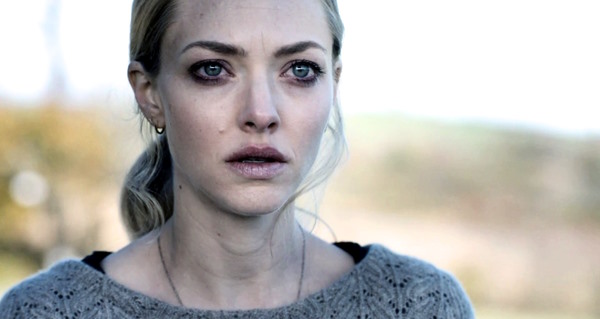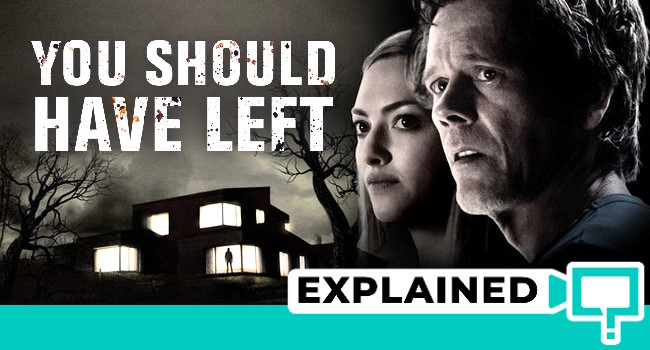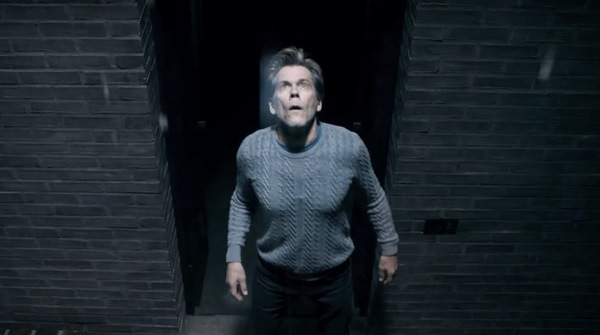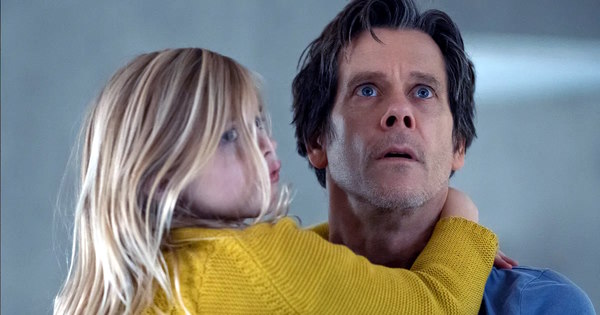Simply put, You Should Have Left is a polarizing movie. Those who love it love it, while those who hate it passionately hate it. This is why the film itself has a ~5 rating on IMDB. Still, like anything else hype-related, you’ll never know for sure until you watch it yourself. The movie is based on the book, and while it borrows some themes, it also deviates from it quite a bit. The basic premise is the same, but some central motifs are missing, including the protagonist’s name. With all of this in mind and without further ado, here’s the plot and ending of You Should Have Left explained; spoilers ahead.
Hollywordle – Check out my new Hollywood Wordle game! Where To Watch? To find where to stream any movie or series based on your country, use This Is Barry’s Where To Watch. Oh, and if this article doesn’t answer all of your questions, drop me a comment or an FB chat message, and I’ll get you the answer. You can find other film explanations using the search option on top of the site.
Contents
Here are links to the key aspects of the movie:
- – Plot Explained
- – Ending Explained
- – What is the movie about?
- – Frequently Asked Questions Answered
- – Who is the Villain ?
- – Movie vs Book
- – Is the movie worth watching?
You Should Have Left: Plot Explained
Intro
Theo Conroy is an older man married to a young actress, Susanna. They have a seemingly happy life with their daughter, Ella. Soon we’re shown that Susanna is a struggling actress and is getting pushed around by directors to do explicit scenes and Theo is visually disturbed by this. With an acting schedule coming up in London, the trio plan a vacation in Wales.
The House
The house that they’re staying in soon starts showing some worrying signs. Namely, after discussing it, they realize that neither of them made the booking, and physically, the house seems to transform, and the lights trigger on their own. The house is a central backdrop of the movie. While technically not filmed in a single location, you’ll often get this impression.
Envy
Since Susana is much younger than him, Theo is tormented by jealousy. This makes him act up, constantly checking her phone, possibly sneaking on the set where she’s working as an actress, etc. Jealousy is also a significant theme in the movie.
The Past
Soon, we find out that one of the reasons why Theo is disliked in his original community is because his wife drowned in the bathtub. Although nothing was ever proven, some people suspect he might have had a hand in her death.
You Should Have Left: What did Theo do? Did he kill his wife?
While Theo doesn’t kill his ex-wife, he stands around watching her drown in the bathtub. He could have easily pulled her out and ended the marriage. But he chooses to stay in the toxic relationship, let it create enough rage in his mind, and finally allows his wife to die. Theo is a vengeful man.
The Town Folk
In Wales, a local shopkeeper warns Theo about the house and gives him a drafting triangle (set square) to measure the angles in the home. He also warns Theo about a man called Stetler and that the house has constantly been destroyed and rebuilt. Another passerby checks with Theo to see if he’s yet met Stetler. This confuses Theo, but he quickly loses track of this when he realizes that Susanna is having an affair with a young actor.
You Should Have Left: Did she cheat? Who is max?
Yes, Susanna is cheating on Theo with a guy called Max from a shoot in Mexico. Although, how Theo catches her is rather silly. That’s how she was getting away with it all the while? By using two phones in plain sight?
Something’s not RIGHT
After Theo asks Susanna to leave for the night, Theo begins observing that the house’s internal dimensions are bigger than the outside. The angles between a wall and the floor are also not consistently at right angles; geometrically impossible stuff. Earlier, Theo also sees a message in his book in his handwriting asking him to leave. Soon Theo and Ella get lost in the elaborate labyrinth through space and time that the house actually is.
Theo finds Ella and tries to walk away from the house, and they see a mysterious figure at the window inside the house. After a freezing trek in one direction without ever taking a turn, they walk right back to the house. Theo realizes they can’t escape and the cold forces them to reenter the house to spend the night.
The House Always Wins
The mysterious Stetler finally kidnaps Ella and explains to Theo that his family will need to pay the price for his sins. And he will release Ella if Theo promises to “do what he must”. Theo agrees and reunites with Ella. In the morning, he confesses to Ella that he let his wife drown. Theo asks Susanna to leave with Ella, and he stays back. He doesn’t try to leave with them as it would only bring them back like the previous night. Susanna doesn’t know anything about the house; she believes Theo is still reacting to her cheating on him.
You Should Have Left: Who wrote in Theo’s journal?
The house appears to have Theo trapped in space and time. We learn that it is Theo who has been opening doors, writing warning notes and watching his family all the while. Theo is the one who writes in his journal and is also the mysterious figure watching Theo and Ella walk away at night.
You Should Have Left: Ending Explained
The ending of the film You Should Have Left reveals that Theo let his ex-wife die, and the house is purgatory that has Theo trapped for that sin he committed and is now plaguing his family too. He faces his guilt and his sin in the end, allowing his family to leave while Theo is consumed by the house.
What is You Should Have Left about?
You Should Have Left is a psychological horror about a man suffering psychological trauma due to his past sin. Moreover, it’s about him dragging his whole family down this path and, eventually, deciding to let them go.
It is also about the grass being greener on the other side. Theo was unhappy with his ex-wife and believed that if he could get out of that marriage (whatever the cost), he could finally be content. Then, he found a younger wife, had a child and started his life anew, but he couldn’t be happy. Jealousy was eating away at him. All of this suggests that he might have been the problem, not his deceased wife (at least not her alone).
Frequently Asked Questions Answered
You Should Have Left: Who is Stetler?
While there is no definitive answer, three theories make the most sense. The first is that Stelter is an evil spirit or even the Devil himself. The townsfolk know him by reputation in a similar way in which they know that the house is haunted. Stetler reveals he looks like Theo in the end, emphasizing that the Devil is within us.
The other explanation is that Stelter is a tormented soul who was once like Theo. Third, is that it’s Theo himself stuck in a time loop – while this is partially true, unlike the movie Triangle this is not a pure time loop movie. Meaning not all the events of the film result from Theo jumping through time.
Who is Ella’s mom?
It does appear that Ella is Theo’s daughter from his previous marriage, but Ella is born to Theo and Susanna. Perhaps it’s the missing chemistry? It could explain why a lot of people were confused about who Ella’s mom is – it’s Susanna.
You Should Have Left: What is the house?
The haunted house is nothing else but purgatory. This is hinted at in a scene where Theo talks to his daughter about Heaven and who gets to go there. As the story progresses, his confident tone changes to a much more uncertain one, which indicates that he is aware of his sins. While talking about death, he’s unwavering; however, when it comes to being held accountable for his sins, this is when he starts being anxious.
As the shopkeeper says, you can’t escape the house since it will always find you. Running from a crime can be easy, but hiding from your conscience is impossible. This further reinforces the concept of the house as purgatory.
Another exciting thing worth addressing is that Susanna and Ella are with him in this purgatory. Anyone in a relationship with someone with a dark past knows that these problems easily overflow into the present. People who are suffering, even when deserving of help, sometimes drag those closest to them down the spiral. In scenarios where redemption is impossible (which is also debatable), the most humane thing one can do is just set them free.
The fact that the house is majestic, with designer roofing and unique architecture, doesn’t change this. It’s not the form of the house but what takes place there that matters. Still, even some of the movie’s harshest critics praised the house’s architecture.
What is the meaning of the movie You Should Have Left?
Suppressed guilt and uncertainty around future punishment are enough to create a real-life purgatory. The biggest problem with this concept is that the person at the center of this purgatory doesn’t suffer alone. Their partners, children, and everyone close suffers with them.
While repenting is important and redemption may be possible, those closest to us sometimes remain by our side regardless of the situation. This sense of loyalty may go as far as to become self-destructive.
They might not be able to save themselves from suffering, but they can free their loved ones from this burden.
Who is the Villain in You Should Have Left?
While the house seems haunted and some strange presences are felt throughout it, Theo is the primary villain of You Should Have Left. His situation is far more complex than it first appears. His last heroic act, where he helps Susana and Ella escape the home, gives the viewer hope for his redemption. Moreover, he accepts that he deserves his punishment, which is already a massive step toward redemption.
His crime is also quite interesting from a relativist standpoint. He did not drown his ex-wife, but he could have helped her and decided not to. The title of the novella/movie might be even more ironic for this very reason. Rather than hoping/allowing someone to drown – he should have left (his marriage).
Sure, there is supernatural presence in the house. The shopkeeper even suggests that the house is a ‘portal’ from which the Devil collects poor unfortunate souls. Still, even if the soul of his late wife haunts the place, Theo is a primary antagonist.
This really doesn’t let Susana off the hook because she does commit adultery, but that is a topic for another book/film.
You Should Have Left: Movie vs Book

The Narrator
One of the most significant differences lies in the fact that Theo is the narrator of the story in the book, which gives the viewer a whole different perspective on the story. The central plot twist is also revealed a lot sooner. The narration in the novella is in a diary form, spanning no more than five days. The most crucial difference is that the narrator doesn’t have a name in the novella. There, he’s merely addressed as the narrator.
House vs Cabin
In the book, the main character and his family stay in a small cabin in the Austrian Alps, while in the movie, they rent a spacious, modernist house in the Welsh countryside. The house in the film You Should Have Left is much larger and more complex than the cabin in the book.
The Fight
Importantly, jealousy is not as big of a motif in the novella. In the movie, Susanna is a young and attractive actress filming passionate scenes that Theo can’t kick out of his head. This is entirely absent from the novella. In the book, the main character is a screenwriter, and their big initial fight is about the screenplay he’s becoming so obsessed with that he’s neglecting his wife.
Horror Elements
While both the book and the movie deal with the concept of a haunted house and the main character’s struggle to distinguish reality from fantasy, the details of the supernatural elements are different. In the book, the main character experiences bizarre visions and encounters strange characters, while in the movie, the supernatural elements are more physical and overt.
Is the Movie You Should Have Left Worth Watching?
The opinions on this are divided, but if you’re asking this question, to begin with, the answer is – yes, you should give it a try. While the execution may not have been perfect, both the movie and the novella deal with serious issues and universal motifs. The themes of jealousy, remorse, and guilt are always worth discussing, and this movie does so effectively.
What were your thoughts on the plot and ending of the movie You Should Have Left? Do leave your comments below.

Stacey is a talented freelance writer passionate about all things pop culture. She has a keen eye for detail and a natural talent for storytelling. She’s a super-fan of Game of Thrones, Cats, and Indie Rock Music and can often be found engrossed in complex films and books. Connect with her on her social media handles to learn more about her work and interests.




